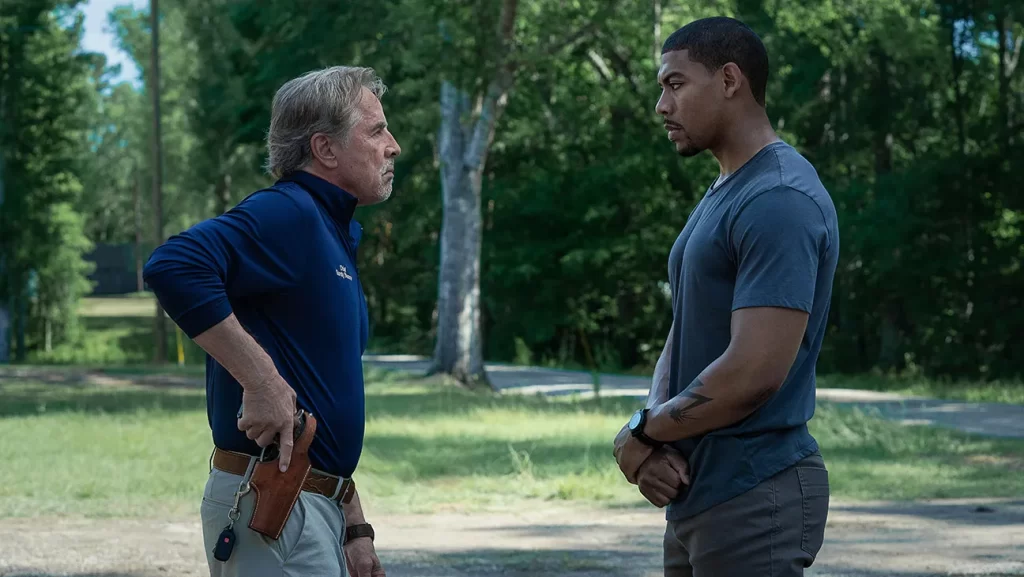
Up until now, Jeremy Saulnier has been something of an “Imagine if” filmmaker. Whether centering on a hapless schmo embroiled in a deadly noir (Blue Ruin) or a punk-rock band trapped by bloodthirsty Nazis (Green Room), his movies have thrust ordinary people into impossible situations, forcing you to contemplate how you might respond in such drastic scenarios. With Rebel Ridge, he attempts to heighten both sides of his unbalanced equation while retaining the same fundamental sense of helplessness. The hero here is the opposite of an everyman; he’s smart, determined, and physically gifted. But he’s still the underdog, because the foe he’s facing is no less than the very institution of American policing.
The chief pleasure of Rebel Ridge is how it packages its big ideas—about racism, class entrenchment, and state-sanctioned violence—into a story that’s small-scale and tidy. Well, initially; as the film progresses, its thematic ambitions grow broader, which has the paradoxical effect of diminishing its boldness. Still, even if Saulnier isn’t always in full control of his thornier ideas, he remains in complete command of his immediate environment. As a polemic, Rebel Ridge is provocative but also uneven; as an action movie, it’s terrific.
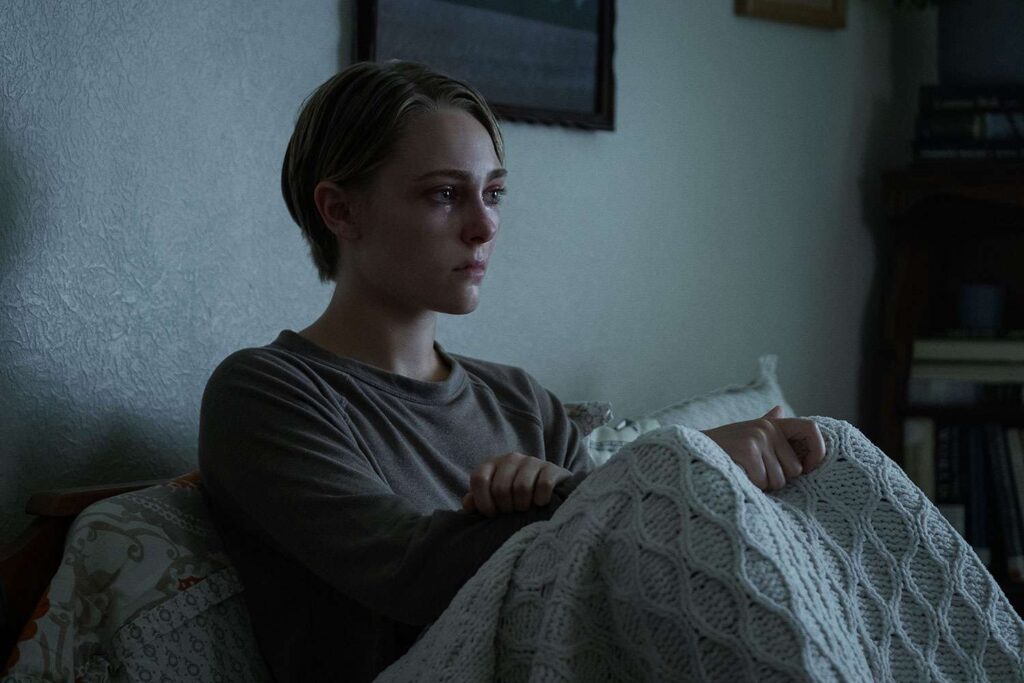
This means it’s most invigorating during its opening act, when it operates as a clean and efficient ticking-clock thriller. Terry (Aaron Pierre) is a former Marine now undertaking a more personal mission: He needs to bail his cousin out of jail, and he needs to do it now. (The screenplay contrives a reason that even an extra day spent in prison could prove fatal for his kin; it isn’t exactly fleshed out, but Saulnier pushes things forward with such speed that you don’t question its credibility.) This seemingly simple task suffers its first complication when Terry is rammed from behind by a pair of cops (David Denman and Emory Cohen) for biking while Black. The tense, terse encounter that follows spawns a daisy chain of escalating events in which an extralegal traffic stop transforms into a treatise on civil liberties, governmental malfeasance, and police brutality.
That sounds like a lot, and in some ways it is, but Rebel Ridge is never better than when it prioritizes the brisk, taut intimacy that characterizes its inciting incident. Saulnier is a muscular director, yet here he evinces an uncommonly nuanced grasp of how uniformed manhandling can be cloaked in the guise of procedural compliance. Terry’s initial arrest detention carries the disturbing specter of bloodshed, but it mostly plays out in dialogue—a series of questions and answers (“Do you consent to search?” “I can get a canine”) that map out the movie’s defining disparity of power. It’s a brilliant fusion of legal realism and cinematic dynamism.
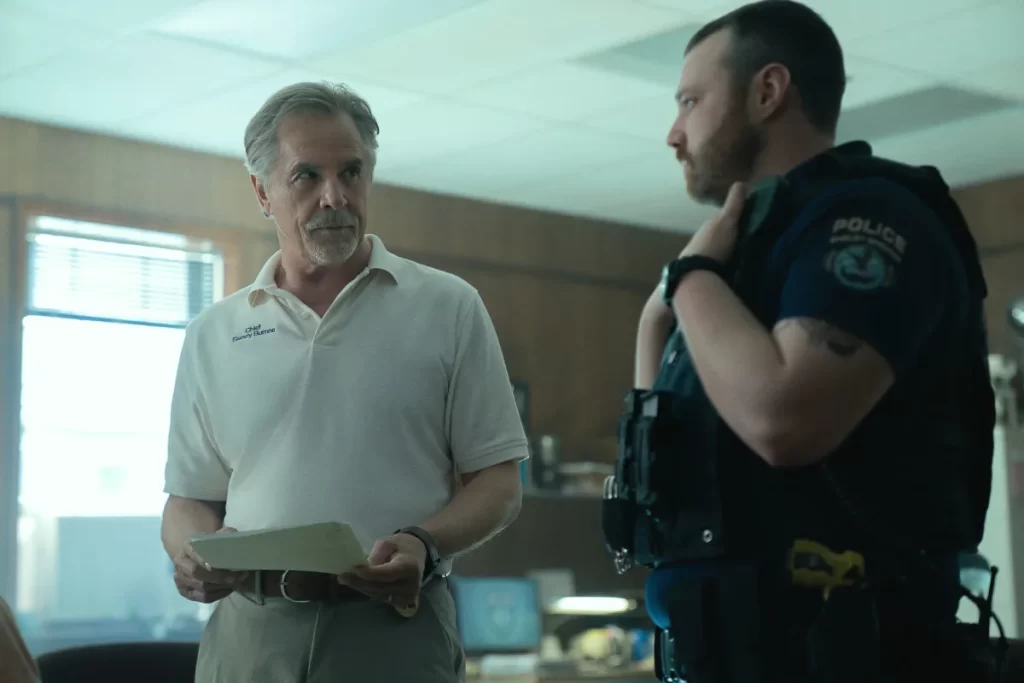
This sequence also embodies Rebel Ridge’s central, stealthy deception: It feels like an old-fashioned shoot-’em-up—the kind of red-meat, cable-TV staple in which a righteous avenger (typically played by someone like Sylvester Stallone) guns down countless enemies while flaunting his physical and moral superiority—yet it ultimately contains very little actual action. Sure, there are fight scenes, car chases, and splashes of gunfire, but they’re staged with a clear-eyed minimalism that’s oddly breathtaking. Even the climax, that phase where most modern action flicks lapse into stale CGI-flecked cacophony, is choreographed with relative lucidity and precision. (It’s initially set to take place at night only for Terry to defer it until sunrise because “I’ve gotta see what’s coming”; as someone who routinely laments that contemporary on-screen mayhem is too underlit for viewers to track, I happily echo his sentiment.)
At first, Saulnier’s careful modulation of his set pieces extends to the scope of his screenplay. Marooned in the fictional hamlet of Shelby Springs (filming occurred in Louisiana), Terry’s tussle with patrolmen leads him to the local police chief, Burnne (Don Johnson), a sneering autocrat who rules his tiny department (and perhaps the whole town) with inflexible authority. He also encounters a more sympathetic figure in the form of Summer (AnnaSophia Robb), a quick-witted law student who’s well-versed in the mockery of justice known as civil asset forfeiture. These characters are sharply drawn, if not exactly three-dimensional; this is an archetypal tale of heroes and villains, even if Saulnier seeks to situate his classic personas inside a plot that grows increasingly sprawling and elaborate.
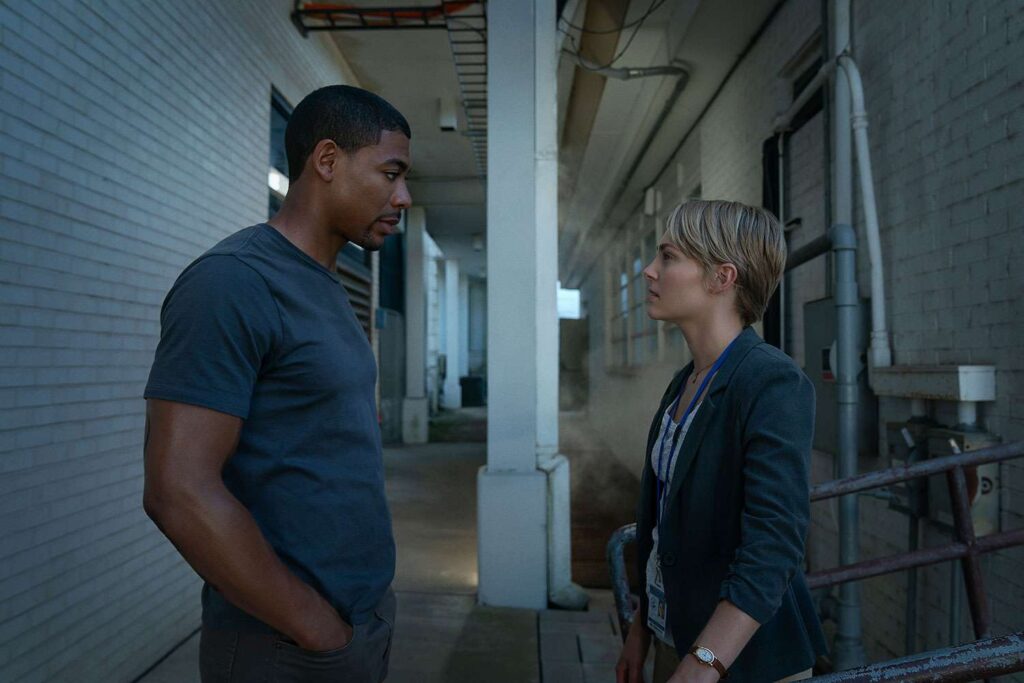
And that, unfortunately, is where Rebel Ridge begins to wobble. In its second half, it attempts to acquire the sociopolitical heft of a labyrinthine conspiracy picture, evoking touchstones like Chinatown and L.A. Confidential. With Summer’s help, Terry discovers that his cousin is just a small piece of a vastly larger, far more troubling scheme—one that implicates not just Burnne’s rogue army but also the police force, the judiciary, and the prison industrial complex. What was once a straightforward rescue mission becomes an act of desperate muckraking, as Terry and Summer risk their lives—not to mention their societal standing (a convenient subplot frames Summer as a mother trying to obtain custody of her daughter)—as they try to throw a harsh light on the town’s shadowy misdeeds.
Philosophically speaking, it’s a cool gambit, but Saulnier’s blunt-force style is an awkward fit for such narrative density. The more he loads the picture with plotty details—about dashcam footage and urine samples and clandestine settlements and moles code-named Serpico—the more he dilutes his otherwise relentless propulsion. Rebel Ridge is a fast-paced and entertaining movie, but it becomes less exciting when your brain is expending so much energy parsing what the hell is going on.
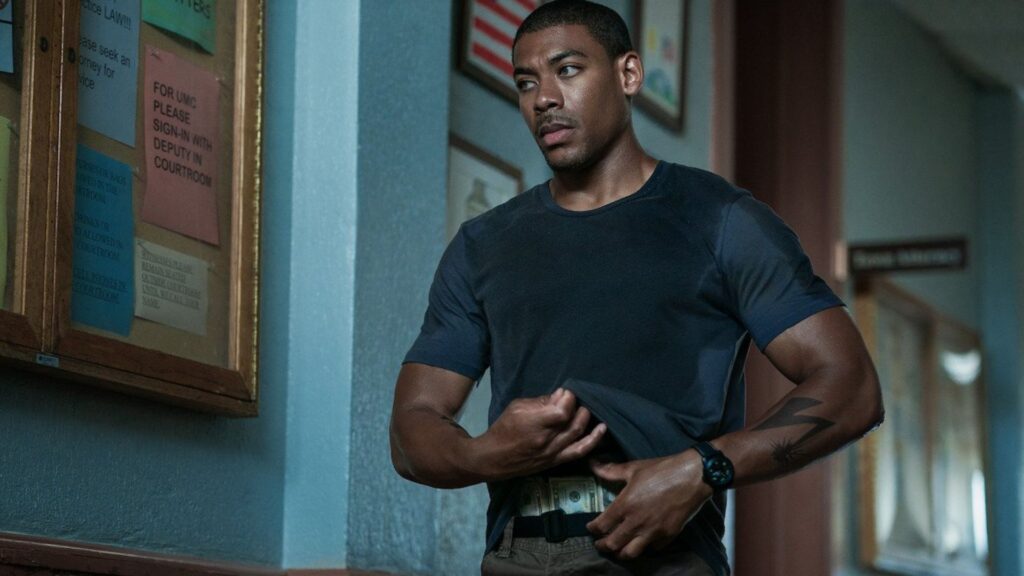
What is more easily perceptible, beyond Saulnier’s sure-handed grasp of action and movement, is the appeal of his actors. Johnson and Robb are ideal supporting players—the sly veteran slipping effortlessly into the role of the heavy, the striving up-and-comer sprinkling in pieces of humanity and fragility—but Pierre has top billing for a reason. He’s an imposing presence, with his slashing eyes and sculpted arms, yet while he exudes movie-star intensity, he also helps illuminate the film’s rumbling disquiet.
Terry, for all intents and purposes, is a costume-less superhero: a hybrid of John Rambo, Jason Bourne, and the Terminator after he’s sworn not to kill anybody. (The moment when he rips a taser dart from his own back is worthy of a true fist-pump.) Yet despite his apparent supremacy—his righteousness, his brawn, his sheer conviction—he’s thwarted at nearly every turn, and his struggles lend this hot-blooded movie a surprising chill. After all, if this dude can be overpowered by a well-oiled machine of corruption, what hope do the rest of us have? For all its supple elegance, Rebel Ridge features plenty of loud moments—gunshots, grenades, explosions. But its scariest noise remains the sound of the police.
Grade: B+
Jeremy Beck is the editor-in-chief of MovieManifesto. He watches more movies and television than he probably should.
